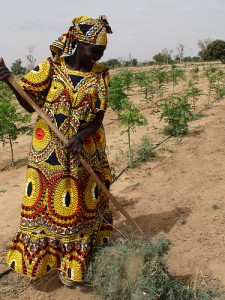In the Maradi area in south central Niger, where 70 percent of the population lives below the poverty line, the months before the harvest are called “the hunger season.” From mid-July to mid-September, food supplies are at their lowest and most families only eat one meal a day.

Since the 1960’s, the entire Sahel region which includes Burkina Faso, Chad, Eritrea, Mali, Mauritania, Niger, Nigeria, Senegal and Sudan, has been experiencing increasingly extreme drought and hunger. The Maradi region has been hit especially hard and cereal harvests have dropped by nearly a third.Strained or empty grain reserves cause many families to sell tools, seeds, and livestock in order to raise money for food and the next planting. Farmers with nothing to sell are forced to work for others to earn an income. Some even leave their homes in search of work in other villages, leaving behind their wives and children to tend to the farm and home on their own.









